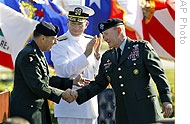voa标准英语2008年-Petraeus Takes Responsibility for Iraq and Afgh(在线收听)
 |
| Gen. David Petraeus, left, shakes hands with outgoing head U.S. Army Lt. Gen. Martin Dempsey in Tampa, Fla., 31 Oct. 2008 |
At a windswept ceremony outside Central Command headquarters in Florida, U.S. Defense Secretary Robert Gates passed the flag of command to General Petraeus, as hundreds of troops and civilians looked on.
Gates called Petraeus one of America's "great battle captains." "He is the preeminent soldier, scholar, statesman of his generation, and precisely the man we need at this command at this time."
Petraeus said the mission of Central Command is difficult, but "of enormous importance" to the United States, the region and the world. "From transnational extremist organizations and industrial-strength insurgencies, to weapons proliferation, a rise in piracy and persistent ethno-sectarian conflict, the CentCom area contains innumerable challenges."
General Petraeus said addressing those challenges requires not only military action, but coordination with U.S. government civilian agencies, coalition partners and countries in the region - what he called a "comprehensive approach."
He said, "This is necessary not just to resolve pressing short-term issues, but to address over time, the underlying conditions that give rise to such serious security challenges."
That type of approach fits with the role of a U.S. regional commander. The senior officers in those jobs spend much of their time meeting with foreign leaders and trying to develop and coordinate broad strategies. Petraeus will start with a review of U.S. strategy in Afghanistan, which is to be ready for the new president and his national security team to review in January.
General Petraeus played a key role in developing the new U.S. counterinsurgency doctrine, which served him well in Iraq, but experts are divided on whether that approach will work in Afghanistan. He said its key principles do apply, including the need to provide security to the people, to train local forces to take over, to talk to reconcilable enemies and to use force to pursue the rest. For that, he said, he will need more U.S. troops in Afghanistan, something the U.S. military services are already working to provide him.